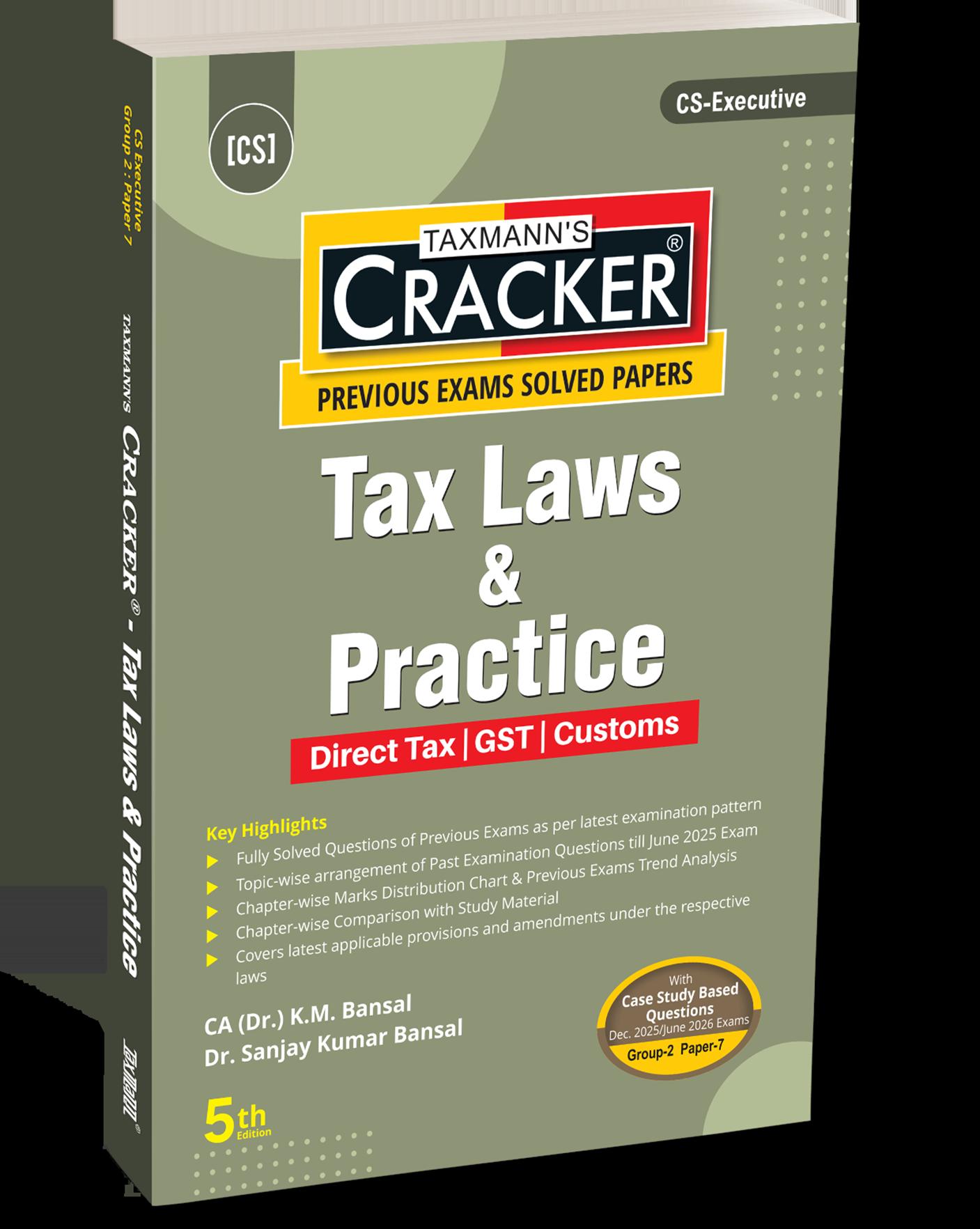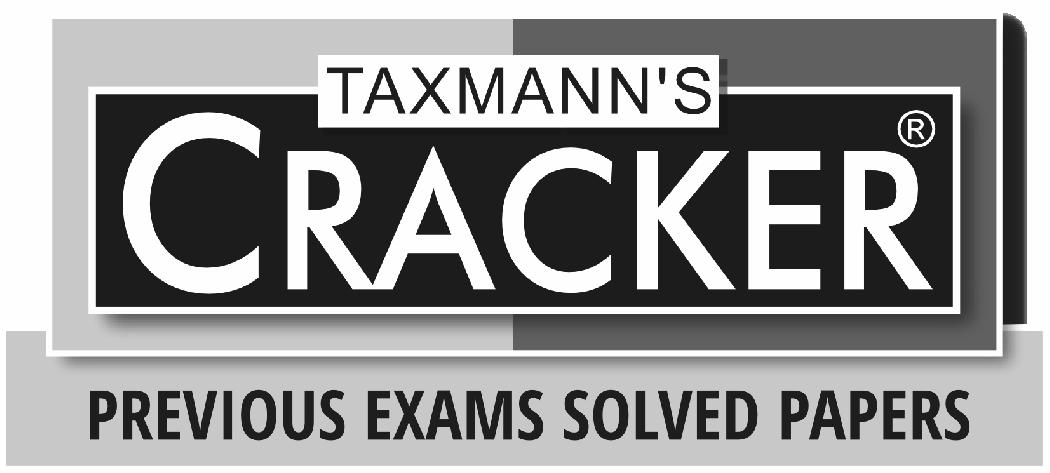PROCEDURAL COMPLIANCE CHAPTER
Q.1 Discuss the statutory obligations of an assessee to file the return of income.
[Dec. 2009] [5 Marks]
Ans.: Statutory obligations of an assessee to file the return of income under section 139 are as follows:
Section
Description
139(1)(a) Every company and firm is required to submit its return of income compulsorily irrespective of their quantum of income.
139(1)(b) An Individual is required to submit his return of income if it exceeds the minimum exemption limit.
139(1) read with fourth proviso An individual (Ordinary Resident) who is not required to file return of income, but holds any asset as beneficial owner outside India.
139(1)( b ) read with sixth proviso
139(1)(b) read with seventh proviso
Every Individual/HUF/AOP/BOI/Artificial Juridical Person is required to file return of income if income exceeds minimum exemption limit before claiming exemptions/deductions under sections 10A, 10B, 10BA, 80C to 80U, 54D, 54EC, 54F, 54G, 54GA, 54GB.
Any person (excluding Company and Firm) who is not required to file return of income under section 139(1), but had done following transactions during the previous year:
Deposited more than ` One Crore in current account with one or more banks.
Incurred more than ` Two Lakhs for travel to a Foreign Country.
Paid more than ` One Lakh for consumption of electricity.
His gross receipts from sale exceed ` 60 Lakhs and from Profession exceeds ` 10 Lakhs.
He is subject to TDS/TCS of ` 25,000 or more (` 50,000 or more for Senior Citizen)
He has deposited ` 50 lakhs or more in one or more saving bank account.
Section
PART I : DIRECT TAX
Description
139(4A) Any person receiving income from property held under a charitable/religious trust is required to file return of income if its income exceeds exemption limit before giving exemption under section 11 or 12.
139(4B) Chief executive officer of a Political Party is required to submit return of income if income exceeds exemption limit before giving exemption under section 13A.
139(4C) If total income exceeds exemption limit before exemption under section 10(21), 10(22B), 10(23A), 10(23AAA), 10(23B), 10(23C), 10(23D), 10(23DA), 10(23EC), 10(23ED), 10(23EE), 10(23FB), 10(24A and B), 10(29A), 10(46), 10(47).
139(4D) Every University/College/Institution mentioned in section 35(1) is required to submit its return of income.
139(4E) and (4F) Submission of return by business trust/investment fund.
Q.2 Write short note on consequences of failure to file return of loss. [Dec. 2010] [3 Marks]
Ans.: Under section 139(3) if return of loss is not filed by an assessee, the following losses cannot be carried forward:
(a) Business loss (Ordinary and Speculative both)
(b) Capital Loss
(c) Loss from activity of owning and maintaining race horses.
Q.3 Mentioned the due dates for filing of return of income for different categories of assessees. [Dec. 2012] [5 Marks]
Ans.: Under section 139(1) following are due dates for filing return of income for different categories of assessees:
Particulars
1. When the assessee is required to furnish a report under section 92E pertaining to international or specified domestic transactions.
2. A company and a non-corporate assessee, not having international or specified domestic transactions.
3. When accounts of the assessee are required to be audited or where assessee is a partner in a firm whose accounts are required to be audited.
4. In all other cases.
30th November
31st October
31st October
31st July
Q.4 Explain the procedure regarding refund of excess tax paid by the assessee to the department. [June 2013] [5 Marks]
Ans.: When the amount paid by the assessee as advance tax/tax deducted or collected at source/paid in any other manner exceeds his tax liability, the refund of excess tax becomes due by the department. Amount of refund shall be paid along with interest as per rules.
When refund arises as a result of order under section 250 or 254 or 260 or 262 i.e. order of commissioner of Income Tax or Appellate Tribunal or High Court or Supreme Court or revision orders u/s 263 or 264, an additional interest at prescribed rate.
Q.5 Indicate three situations where the Return of Income has to be compulsorily filed under section 139(1) of the Income-tax Act, 1961. [June 2019] [3 Marks]
Ans.: Following are the three situations when Return of Income has to be compulsorily filed under section 139(1) of the Income-tax Act, 1961:
1. Companies and Firms (whether having profit or loss or nil income).
2. A person, being a resident other than not ordinarily resident, who holds, as beneficial owner or otherwise, any asset (including any financial interest in any entity) located outside India or has singing authority in any account located outside India, or is a beneficiary of any asset (including any financial interest in any entity) whether or not having income chargeable to tax.
3. Individuals, Hindu Undivided family, Association of Person or Body of Individual and Artificial Juridical Persons whose total income before giving effect to the provisions of Chapter VIA exceeds the maximum amount not chargeable to tax.
Q.6 State whether quoting of PAN in the following transactions is mandatory or not, as per provisions of Income-tax Act, 1961:
(1) A makes payment to Hotel Radisson Ahmedabad of ` 50,000 against the bill raised by the Hotel.
(2) Abhishek, in a single transaction makes contract of ` 1,20,000 for sale/purchase of securities (other than shares) as defined in section 2(h) of the Securities Contracts (Regulation) Act, 1956.
(3) Payment to Mutual Funds of ` 70,000 for purchase of its units. Your answers must be supported with reasons. [June 2019] [3 Marks]
Ans.: 1. PAN is not required to be quoted: Mr. A is not required to quote his PAN while making payment of ` 50,000 to Hotel Radisson, Ahmedabad since such payment does not exceed ` 50,000.
2. PAN is mandatorily required to be quoted: Mr. Abhishek is required to quote his PAN while making contract of ` 1,20,000 for sale/purchase of securities (other
PART I : DIRECT TAX
than shares) as defined in section 2(h) of the Securities Contracts (Regulation) Act, 1956, since the amount of the transaction exceeds ` 1,00,000.
3. PAN is required to be quoted: PAN is mandatorily required to be quoted while making payment of ` 70,000 to Mutual Funds for purchase of its units, since payment exceeds ` 50,000.
Q.7 Discuss the procedure of Summary Assessment under the Income- tax Act, 1961 [Dec. 2010] [5 Marks]
Ans.: Under section 143(1), the Assessing Officer can assess the case without passing a regular assessment order on the basis of particulars mentioned in the return submitted by the assessee. However he can make following adjustments in computation of taxable income:
1. Arithmetical error in return
2. Disallowance of incorrect claim, expenditure etc.
3. Disallowance of deductions/exemptions claimed under section 10AA and/ or 80HH to 80RRB.
However before making such adjustments an opportunity shall be given to the assessee to explain and rectify within 30 days. In case no response is received within such time the Assessing Officer will pass assessment order. This is called Summary Assessment.
Q.8 Distinguish between ‘Scrutiny Assessment’ and ‘Best judgment Assessment’. [June 2009] [2 Marks]
Ans.:
Scrutiny Assessment Best judgment Assessment
1. Taxpayer has not understated the income or has not computed excessive loss or has not under paid the tax in any way
2. Assessing Officer carries out detailed scrutiny.
3. U/s 153, the time limit for making scrutiny assessment under section 143(3) is 12 months from the end of Assessment Year in which the income was first Assessment [AY 2019-20 and onwards]
Assessing Officer will act honestly to do assessment.
In case of Non-cooperation on part of assessee or when Assessing Officer is not satisfied, judgment is a process of reaching a judicial decision to the best of the reasons.
The time-limit for completion of assessment u/s 144 is 12 months from the end of the AY in which the income was first assessable.
Q.9 Write notes on the following:
1. Best judgment assessment under section 144.
2. Assessee under section 2(7) [Dec. 2009] [4 Marks each] [June 2014 New] [5 Marks]
Ans.: 1. The Best Judgment Assessment under section 144 is related to non-compliance by a person in following cases:
Fails to furnish return or updated return under section 139(1)/(4)/(5) or 139(8A).
Fails to comply with all terms of a notice under section 142(1).
Fails to get his accounts audited.
Fails to respond to a scrutiny notice under section 143(2).
Also when the Assessing Officer is not satisfied about correctness of the accounts.
In such cases and circumstances the Assessing Officer will give an opportunity to the assessee for hearing his case.
When the assessee is unable even thereafter the Assessing Officer will make assessment after considering all relevant matter before him and pass assessment order without prejudice to the assessee. This is called best judgment assessment.
2. Assessee under section 2(7) is a person who is liable to pay tax either on own income or income of others as follows:
Every person by whom tax including interest and/or penalty is payable.
Any person against whom assessment proceeding has been taken for income/loss/refund/recovery of tax etc.
A person who is deemed assessee for assessment of other’s income by virtue of section 160(2).
A person who is deemed to be an assessee in default under section 201(1). In this category any person who does/did not deduct tax source or after deducting tax fails to deposits in time.
If a person does not pay advance tax, he will be assessee in default under section 218.
Q.10 Distinguish between the defective return of income and belated return of income. [Dec. 2009] [4 Marks]
Ans.: DEFECTIVE RETURN OF INCOME:
Under section 139(a) when in the opinion of Assessing Officer the return of income submitted by taxpayer is defective, he may ask the assessee to rectify the defect within 15 days (or extended period). After rectification of the defect
PART I : DIRECT TAX
the Assessing Officer shall assess the case. Failing to rectify it will be treated as invalid.
BELATED RETURN OF INCOME:
If return of income is not submitted within stipulated time under section 139(1) or within extended time allowed by the Assessing Officer under section 142(1) and submitted thereafter, it is called belated return of income. In such case the assessee shall be liable to pay interest under section 234A and late filing fee under section 234F.
Q.11 What are the requisites for filing a Revised Return under the Incometax Act, 1961? [Dec. 2010] [5 Marks]
Ans.: Revised return can be filed under section 139(5). The following are requisites:
1. Any person who had already filed return under section 139(1), finds any mistake or wrong statement therein, he can furnish a revised return.
2. Any person who had filed belated return under section 139(4) can also file revised return.
3. Revised return can be filed up to 31st December or before assessments, whichever is earlier.
4. A second revised return can also be filed if some omission or wrong statement is found in first revised return.
Prior permission for filing revised return is not required.
Q.12 Briefly mention the concept of Self-Assessment Tax u/s 140A of the Income-tax Act, 1961 and its components. [June 2019] [3 Marks]
Ans.: Self-Assessment Tax u/s 140A of the Income-tax Act, 1961: Where any tax is payable on the basis of any return required to be furnished under section 139 of the Income-tax Act, 1961, after taking into account:
1. The amount of tax, if any, already paid under any provision of this Act;
2. Any tax deducted or collected at source;
3. Any relief of tax or deduction of tax claimed under section 90 or section 91 on account of tax paid in a country outside India;
4. Any relief of tax claimed under section 90A on account of tax paid in any specified territory outside India referred to in that section; and
5. Any tax credit claimed to be set off in accordance with the provisions of section 115JAA or section 115JD, The assessee shall be liable to pay such tax together with interest and fee payable under any provision of this Act for any delay in furnishing the return or any default or delay in payment of advance tax, before furnishing the return and the return shall be accompanied by proof of payment of such tax interest and fee.
Where the amount paid by the assessee under this sub-section falls short of the aggregate of the tax interest and fee as aforesaid, the amount so paid shall first be adjusted towards the fee payable and thereafter towards the interest payable as aforesaid and the balance, if any, shall be adjusted towards the tax payable.
Q.13 The Assessing Officer has the power to make an assessment to the best of his judgment, in certain situations. What are they?
[June 2019] [3 Marks]
Ans.: As per section 144 of the Income-tax Act, 1961, the Assessing Officer, after taking into account all relevant material which he has gathered, and after giving the assessee an opportunity of being heard, makes the assessment of the total income or loss to the best of his judgment and determines the sum payable by the assessee on the basis of such assessment in the following cases:
1. Where any person fails to file the return required under section 139(1) and has not made a return or a revised return under section 139(4) or 139(5), or
2. When a person fails to comply with all the terms of a notice issued under section 142(1) or fails to comply with a direction issued under section 142(2A) for getting the accounts audited, or
3. If any person having made a return, fails to comply with all the terms of a notice issued under section 143(2).
Further, as per section 145, where the Assessing Officer is not satisfied about the correctness or completeness of the accounts of the assessee, or where the method of accounting provided in sub-section (1) has not been regularly followed by the assessee, or income has not been computed in accordance with the standards notified under sub-section (2), the Assessing Officer may make an assessment in the manner provided in section 144.
Q.14 Explain the quantum of late fees under section 234F for delay in furnishing return of income within the prescribed time limit under section 139(1). [June 2019] [2 Marks]
Ans.: Late fee under section 234F is attracted where a person, who is required to furnished a return of income under section 139 of the Income-tax Act, 1961, fails to do so within the time limit prescribed under section 139(1).
1. A fee of ` 5,000 shall be payable, if the return is furnished after due date.
2. However, in a case where total income does not exceed ` 5 lakhs, the fee amount shall not exceed ` 1,000.
Q.15 Distinguish between belated Return of Income and Revised return of Income. [June 2011] [3 Marks]
Ans.: If the return of income is not filed within stipulated time under section 139(1) or within time allowed under section 142(1), it is called belated return under section 139(4).
PART I : DIRECT TAX
If the assessee, after submission of return under section 139(1)/(4) finds any omission or wrong statement therein, he may furnish a revised return up to December 31 or date of assessment, whichever is earlier.
Q.16 Distinguish between Summary Assessment and Scrutiny Assessment. [June 2011] [3 Marks]
Ans.: Summary Assessment is done by the Assessing Officer on the basis of available details in the return. Scrutiny Assessment is done by the Assessing Officer after issue of a notice to the assessee under section 143(2) within 3 months from end of financial year. After hearing the assessee and scrutinizing all documents assessment order is passed.
Q.17 Write note on Consequences of failure to link PAN with Aadhaar. [June 2011] [3 Marks]
Ans.: Every person is required to link PAN with Aadhaar (section 139AA) and quote these at appropriate level. However if a person has failed to do so up to March 31st, 2023, consequences shall be under section 234H as follows:
1. During April 2022 and June 2022: PAN can be linked with Aadhaar with late fee of ` 500.
2. During July 2022 and March 2023: with late fee of ` 1,000.
3. On or after 1st April, 2023: PAN cannot be linked with Aadhaar and PAN becomes inoperative.
Q.18 Mr. Ajit did not file the return of income on the due date. Can he file the return of income after due date? State in brief. [Dec. 2011] [2 Marks]
Ans.: In case Mr. Ajit did not file return of income on the due date under section 139(1) or within the time allowed in response to notice issued under section 142(1), he can file the return of income any time before December 31 or before completion of assessment done under section 143(3) or 144 whichever is earlier.
Q.19 Describe the different modes of collection and recovery on Income Tax. [Dec. 2011] [5 Marks]
Ans.: Under section 206C, the different modes for collection and recovery of income tax at prescribed rates in following categories of items are as under:
1. Category A [(Section 206(1)]: The seller shall collect tax from the buyer of goods. Tax rates vary on different items.
2. Category B [Section 206C(1C)]: The person who grants a lease or a license for the purpose of business shall collect tax at source. Tax rate is 2%.
3. Category C [Section 206(1D)]: Not applicable with effect from 01.04.2017.
4 Category D [Section 206C(1F)]: Tax is collected by the seller of motor vehicle of value exceeding ` 10,00,000. Tax rate is 1% of the sales consideration.
5. Category E [Section 206C(1G)]: Foreign remittance through Liberalized Remittance Scheme (LRS) of 7 lakh or more in a financial year and selling of overseas tour package. Tax rate is 5%.
Category F [Section 206C(1H)]: On sale of other goods value exceeding ` 50 lakhs by a person whose total turnover from business exceeded ` 10 crores during immediately proceeding previous year. Tax on sale consideration exceeding ` 50 lakhs @ 0.1%.
Q.20 Who is liable to pay advance tax? On what dates the instalments of advance tax are payable and what amount is to be paid under each instalment? [June 2009] [4 Marks]
Ans.: Advance tax shall be payable during a financial year in every case where the amount of such tax payable by the assessee during that year, as computed in accordance with the provisions of advance tax, is ` 10,000 or more.
Instalments of advance tax and due dates [Section 211]:
Due date of Instalment
Amount Payable
A 1. On or before 15th June Not less than 15% of advance tax.
2. On or before 15th September Not less than 45% of advance tax. It means 45% of advance tax, less the amount paid in earlier instalment i.e. 30%
3. On or before 15th December Not less than 75% of advance tax. It means 75% of advance tax, less the amount paid in earlier instalment i.e. 30%
4. On or before 15th March 100% of advance tax as reduced by the amounts paid in earlier instalments i.e. 25%.
B 1. On or before 15th March An eligible assessee in respect of eligible business (Section 44AD) or eligible profession (Section 44ADA) shall pay the whole amount of advance tax on or before 15th March of the relevant previous year.
Note: Any payment of advance tax made on or before 31st March shall also be treated as advance tax paid during the previous year.
Q.21 Narayan had to pay ` 1,13,300 as advance tax during the financial year 2024-25. He has deposited the amount of advance tax as follows: Date
(`)
15.09.2024 29,760
15.12.2024 36,400
15.03.2025 47,140
Is he liable to pay any interest under section 234C? If yes, determine the amount of interest payable by him. [Dec. 2010] [5 Marks]
PART I : DIRECT TAX
Ans.: Calculation of interest payable by Narayan on late payment of advance tax during the financial year 2024-25 under section 234C. (Total amount payable ` 1,13,300).
Q.22 The Tax Payable for the Assessment Year 2025-26 by an individual is ` 1,23,600. He has deposited the following amount as advance tax.
Compute the Interest Payable under section 234C. [Dec. 2009] [5 Marks]
Ans.: Calculation of Interest payable by an individual on late payment of advance tax for the Assessment Year 2025-26 under section 234C. (Total amount payable ` 1,23,600): No.







